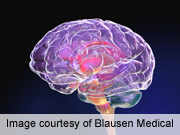
TUESDAY, Nov. 6 (HealthDay News) — In combat veterans with post-traumatic stress disorder, the area of the brain that controls fear and anxiety responses is much smaller than normal, according to a new study.
The finding is the first to provide evidence that a smaller amygdala is associated with post-traumatic stress disorder (PTSD), but it’s not clear whether this smaller size is caused by PTSD or whether people with a smaller amygdala are more likely to develop PTSD, the researchers said.
For the study, MRI brain scans were conducted on 200 combat veterans, half with PTSD and half without, who served in Iraq and Afghanistan since 2001. MRI brains scans of the participants showed that both the right and left amygdala were smaller in those with PTSD.
The researchers also confirmed previous study findings that linked PTSD with a smaller left hippocampus, a region of the brain that plays an important role in memory.
Amygdala size does not appear to be affected by the severity, frequency or duration of the mental trauma that can lead to PTSD, which indicates that such exposures do not cause the amygdala to shrink, said study lead author Dr. Rajendra Morey, assistant professor of psychiatry at Duke University.
This suggests that people with a smaller amygdala to begin with are susceptible to PTSD. Morey and colleagues are conducting further research to determine if that’s the case.
“This is one piece in a bigger puzzle to understanding why some people develop PTSD and others do not,” Morey said in a university news release. “We are getting closer to that answer.”
The study was published Nov. 5 in the journal Archives of General Psychiatry.
PTSD affects nearly 14 percent of U.S. combat veterans from the Iraq and Afghanistan wars, according to the U.S. Department of Veterans Affairs. It also affects nearly 7 percent of adults in the general population who have been victims of abuse, crime and other traumas during their lives.
More information
The U.S. National Institute of Mental Health has more about post-traumatic stress disorder.

